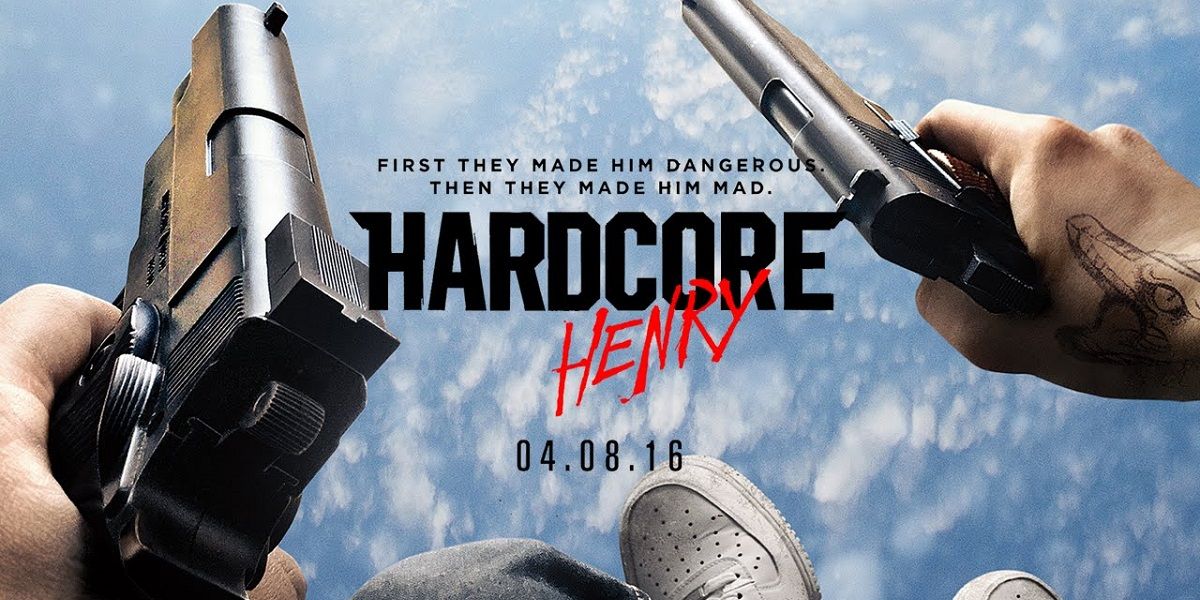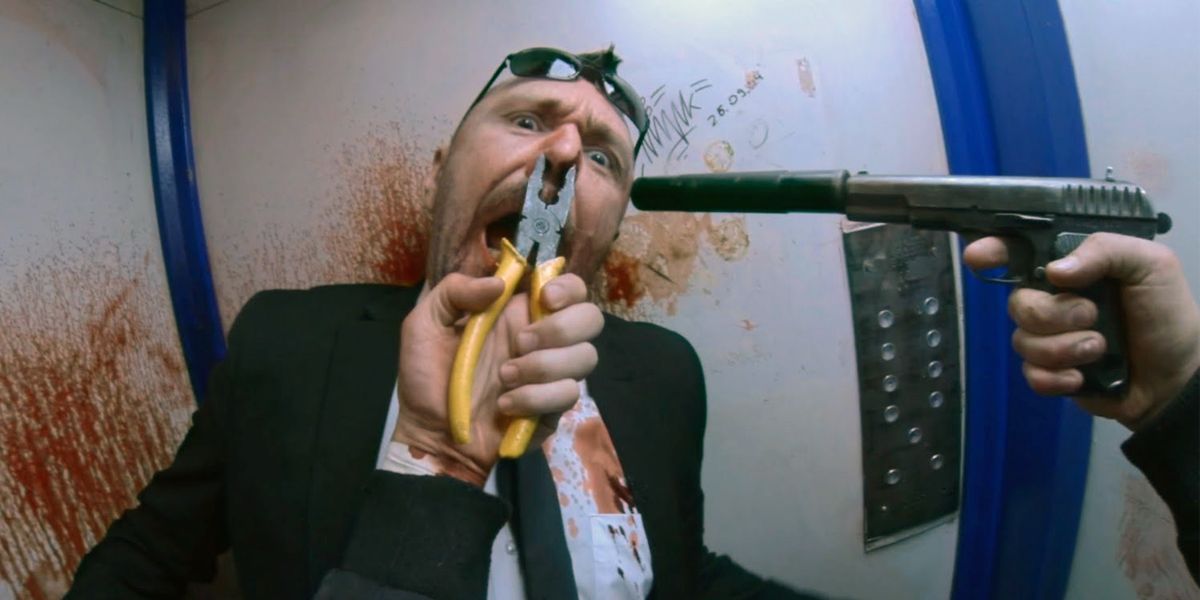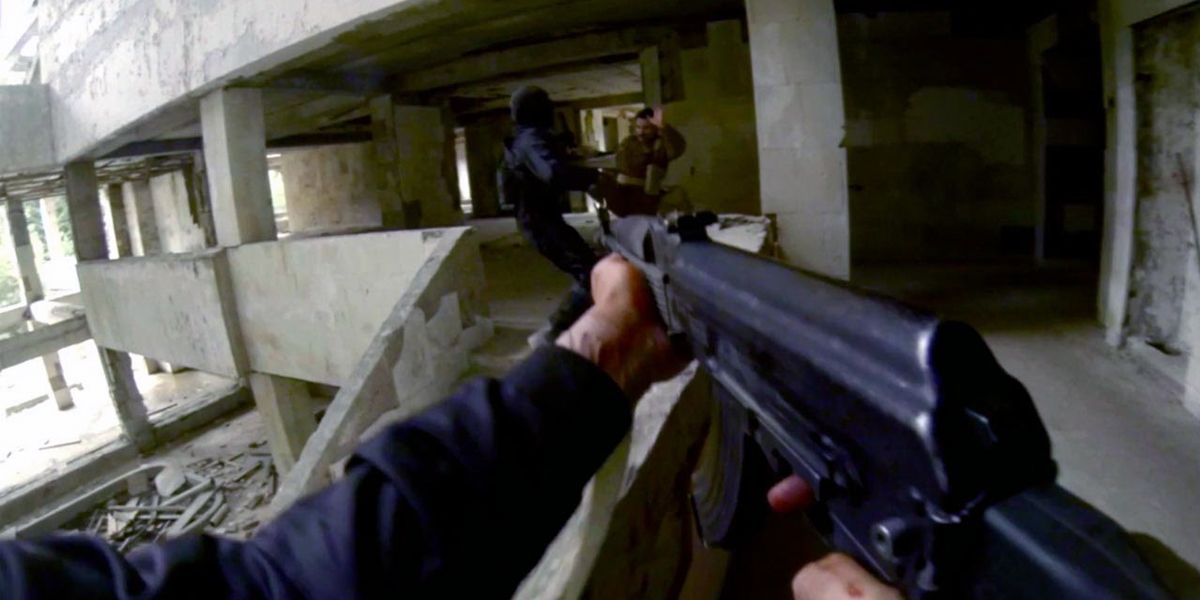Warning: mild spoilers for Hardcore Henry ahead.
-
Hardcore Henry innovates (a word which here means "throws ideas against the wall") at such a frenetic pace, and so proudly, that it's kind of a shock to realize that it actually does have a classical narrative inspiration at its core: It's a Frankenstein movie.
As the story opens "Henry" wakes up on an operating table in a high-tech laboratory, watching as a pretty doctor attaches cybernetic replacement-parts to his missing left arm and leg. She says she's his wife, that her name is Estelle, that his name is Henry, that he was horribly maimed in some unspecified earlier event (which has also temporarily robbed him of his memories) and that she's used her advanced science to rebuild him. The facility is then attacked by a cackling bleach-blonde supervillain with telekinetic powers who wants Estelle's research to build himself an army of cyborg soldiers, forcing the couple to flee for the streets of what turns out to be Moscow - where Estelle is abducted anyway. And so off we go.
All this before they've had a chance to activate Henry's ability to speak.
So, yes. Hardcore Henry isn't doing its "live-action video game" business by half measures. Not only does the entire film play out from Henry's own perspective in first-person (though not in real time); the ill-defined futurism of the setting contrives to present the mute, newly-minted cyborg as a flesh and blood (and titanium) incarnation of the type of protagonist that's come to define video game "heroism" in the age of Call of Duty: A voiceless, backstory-deprived bullet-sponge ordered to undertake a series of missions (each one handily summarized as "go to this spot on the map and murder someone we've told you is bad") to rescue Princess Peach - oh, but we've given her a lab coat, so she's not exactly Princess Peach. We're very progressive like that.
Those "missions" are handed down by Sharlto Copley as - literally - a living embodiment of a generic NPC (non-player character) named "Jimmy", who seems to pop in and out of Henry's adventure offering instructions and newer/better weapons in different disguises and personas (a stoner, a cop, a British WWI army major, a coked-out madman throwing himself a brothel orgy) even as he's killed multiple times - like a video game is re-using its assets. There's eventually an explanation for what's going on with Jimmy, but like most of Hardcore Henry's higher-concept story flourishes it feels reverse-engineered from a question of "How can we make this familiar bit of video game nonsense exist in reality?"
It's a new approach to making a movie, for certain. Earlier films have used game logic as a metaphor for real-world issues, most notably Tron imagining reprogramming and file-corruption as something like theocratic indoctrination, or Wreck-It-Ralph wondering if video game characters ever get tired of living out of their pre-programmed roles. Hardcore Henry is a different creature with an altogether different agenda: using the familiar visual and narrative cues of video games both to signal narrative beats to the audience, and to absolve itself of the logistical needs that often hold action films back from "cutting loose" when we most want them to. Plenty of modern action films want to ape the "all-killer, no-filler" structure of gaming, where the action starts and stops because the developers said so - and the next level (complete with all new backgrounds and enemies) is just a screen away with little to no narrative transition required. However, that's difficult to achieve without leaving an audience feeling utterly disconnected from whatever narrative you might have been attempting. Hardcore Henry's solution? If it's going to play out like a game, it might as well look like one, too. Whether that's inspired or reductive will, of course, be up to the audience.
Just as some films have been known to use audio-visual reference to excuse what might otherwise have been a shortcoming (i.e. fake "Grindhouse" film-grain or scratches to mimic the sensibility of a B-movie so that cut-rate special effects feel somehow appropriate), Henry locks its camera into FPS-vision and trusts that enough of the audience is familiar with the PlayStation aesthetic that this will make it more "acceptable" for the hero to bounce from one mission to the next. Sharlto Copley wandering into the frame once every few minutes to say "Go to X and fight Y to the death" in lieu of a conventional act structure? The recipe for a jumbled storytelling mess in a movie, but in a video game it's standard operating procedure - and the film's big creative gambit is that proudly stamping "video game" on its figurative forehead will entitle it to the same adjustments in expectation.
Whether it works as a film is another story altogether, but Hardcore Henry has a secondary side-effect that's potentially a bit more interesting. By presenting gaming tropes not only divorced from the visceral empathy of being the player (i.e. we forgive the absurdities of game-logic because we're playing for the experience they exist to bring about) but also dropped into a (mostly) realistic setting, the film manages - maybe without even trying - to be the kind of brutal yet affectionate parody the gaming medium seems to have been yearning for.
To say that Hardcore Henry satirizes the video games it clearly adores would be pushing it (its barbs are much more Robin Hood: Men In Tights than Blazing Saddles, to give a sense of its comic depths), but it's a send-up through and through, and the mere fact of seeing Henry stumble and catch his breath doing the free-running stunts that game protagonists undertake without breaking a virtual sweat is quietly revelatory - think Nicholas Cage breaking up the bad-ass "superhero suit-up" montage in Kick-Ass to apply his eye makeup. At one point he happens onto a horse and mounts it to a swell of Western-inspired music... only to go tumbling off moments later, because horseback riding is a difficult skill and there's zero reason to assume Henry would just know how to do it. And gamers will likely find themselves smiling when, during a major action sequence, the hero's gaze fixes on... a first-aid kit.
More interesting still is the way it suggests the visual language of games beyond its novel use of the first-person perspective might be incorporated into cinematic narrative more broadly. Like any good Frankenstein story (or, really, even the bad ones) Hardcore Henry wants to be "about" what a creation owes its creator, and the very idea of identity and one's choice in their own destiny. The movie pays those existential questions off in a succession of third act twists about the nature of Henry's objective-oriented trajectory that will be familiar to video games fans who've been down similar avenues of self-examination in Portal or Spec Ops: The Line. But the film's construction also borrows gaming's very literal markers of progress and improvement (achievements, "power-ups") and adapts them to bear a figurative weight as well. At one point, after triumphing over a particularly dangerous opponent, Henry cracks open the man's chest and pulls out a piece of tech to add to his own (in similarly grotesque fashion) - instantly upgrading his strength and fighting ability. Funny, but also a novel shortcut to the training montages or other explanations that usually accompany such improvement.
It remains to be seen whether borrowing the language of games has any practical use for moviemaking outside of action films aimed mostly at gamers (and it hasn't really been fully "proven" there until we see what audiences actually make of Hardcore Henry), but the possibilities are intriguing. Could, for example, the aesthetics of visual novels and dating sims be combined with a traditional romantic comedy? Would personal journeys or relationship dramas benefit from visualizing algorithmic-progression, or what gaming calls "experience?" If so, Hardcore Henry could find itself regarded as a vanguard for a new encapsulation of cinematic expression - not bad, for a movie that mostly wants to find ever more inventive ways to blow people up.
Hardcore Henry is in theaters now.




